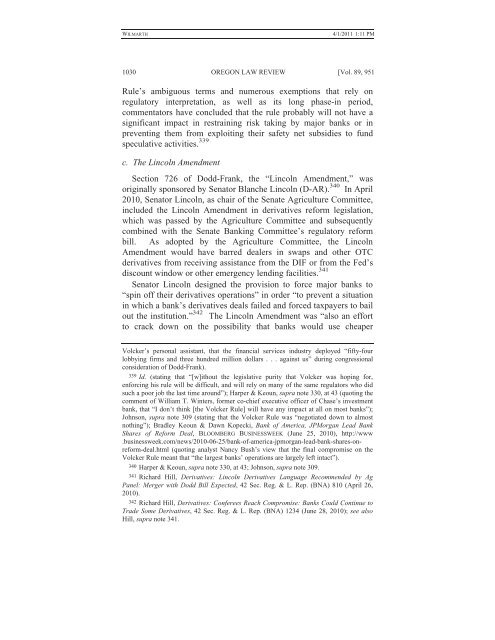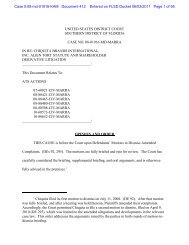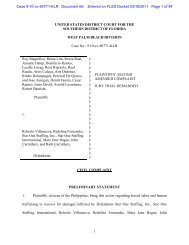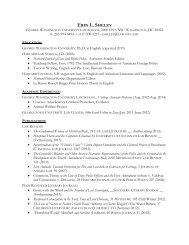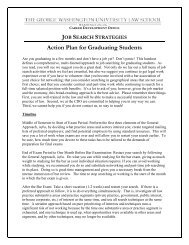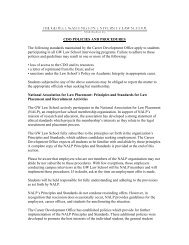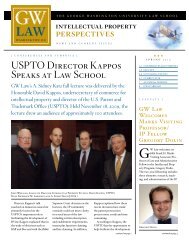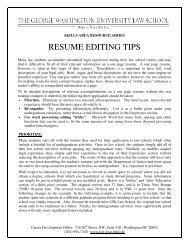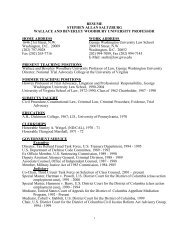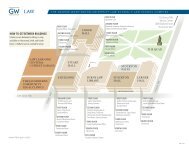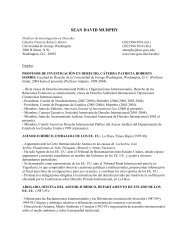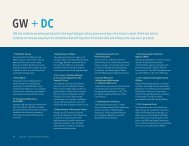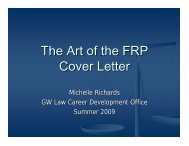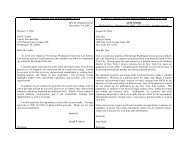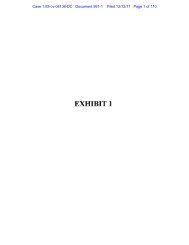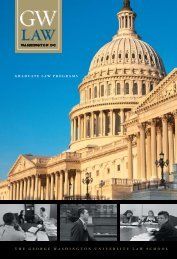CLE Materials for Panel #1 - George Washington University Law ...
CLE Materials for Panel #1 - George Washington University Law ...
CLE Materials for Panel #1 - George Washington University Law ...
You also want an ePaper? Increase the reach of your titles
YUMPU automatically turns print PDFs into web optimized ePapers that Google loves.
WILMARTH<br />
4/1/2011 1:11 PM<br />
1030 OREGON LAW REVIEW [Vol. 89, 951<br />
Rule’s ambiguous terms and numerous exemptions that rely on<br />
regulatory interpretation, as well as its long phase-in period,<br />
commentators have concluded that the rule probably will not have a<br />
significant impact in restraining risk taking by major banks or in<br />
preventing them from exploiting their safety net subsidies to fund<br />
speculative activities. 339<br />
c. The Lincoln Amendment<br />
Section 726 of Dodd-Frank, the “Lincoln Amendment,” was<br />
originally sponsored by Senator Blanche Lincoln (D-AR). 340 In April<br />
2010, Senator Lincoln, as chair of the Senate Agriculture Committee,<br />
included the Lincoln Amendment in derivatives re<strong>for</strong>m legislation,<br />
which was passed by the Agriculture Committee and subsequently<br />
combined with the Senate Banking Committee’s regulatory re<strong>for</strong>m<br />
bill. As adopted by the Agriculture Committee, the Lincoln<br />
Amendment would have barred dealers in swaps and other OTC<br />
derivatives from receiving assistance from the DIF or from the Fed’s<br />
discount window or other emergency lending facilities. 341<br />
Senator Lincoln designed the provision to <strong>for</strong>ce major banks to<br />
“spin off their derivatives operations” in order “to prevent a situation<br />
in which a bank’s derivatives deals failed and <strong>for</strong>ced taxpayers to bail<br />
out the institution.” 342 The Lincoln Amendment was “also an ef<strong>for</strong>t<br />
to crack down on the possibility that banks would use cheaper<br />
Volcker’s personal assistant, that the financial services industry deployed “fifty-four<br />
lobbying firms and three hundred million dollars . . . against us” during congressional<br />
consideration of Dodd-Frank).<br />
339 Id. (stating that “[w]ithout the legislative purity that Volcker was hoping <strong>for</strong>,<br />
en<strong>for</strong>cing his rule will be difficult, and will rely on many of the same regulators who did<br />
such a poor job the last time around”); Harper & Keoun, supra note 330, at 43 (quoting the<br />
comment of William T. Winters, <strong>for</strong>mer co-chief executive officer of Chase’s investment<br />
bank, that “I don’t think [the Volcker Rule] will have any impact at all on most banks”);<br />
Johnson, supra note 309 (stating that the Volcker Rule was “negotiated down to almost<br />
nothing”); Bradley Keoun & Dawn Kopecki, Bank of America, JPMorgan Lead Bank<br />
Shares of Re<strong>for</strong>m Deal, BLOOMBERG BUSINESSWEEK (June 25, 2010), http://www<br />
.businessweek.com/news/2010-06-25/bank-of-america-jpmorgan-lead-bank-shares-onre<strong>for</strong>m-deal.html<br />
(quoting analyst Nancy Bush’s view that the final compromise on the<br />
Volcker Rule meant that “the largest banks’ operations are largely left intact”).<br />
340 Harper & Keoun, supra note 330, at 43; Johnson, supra note 309.<br />
341 Richard Hill, Derivatives: Lincoln Derivatives Language Recommended by Ag<br />
<strong>Panel</strong>: Merger with Dodd Bill Expected, 42 Sec. Reg. & L. Rep. (BNA) 810 (April 26,<br />
2010).<br />
342 Richard Hill, Derivatives: Conferees Reach Compromise: Banks Could Continue to<br />
Trade Some Derivatives, 42 Sec. Reg. & L. Rep. (BNA) 1234 (June 28, 2010); see also<br />
Hill, supra note 341.


